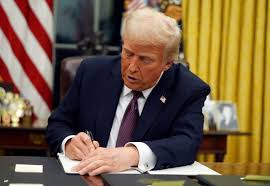
The months since President Trump’s election have been characterised by jitters in the global health community.
These jitters have not been unfounded based on actions he took in his First term such as expanding the global gag rule, which led to widespread disruption of health programmes.
Nothing though could have prepared the world for the shocking decision to dismantle USAID overnight in what some have termed “geopolitical vandalism” .
The impact of this decision will take time to comprehend, partly because data systems that track the impact of various programmes across the world have also been closed.
The termination of more than 85 per cent of 6,300 projects in less than a month of review preceded by stop-work orders and piecemeal exemptions was highly disruptive. The drastic decision was taken without consulting key players: large INGOs that were the preferred contractors for USAID, thousands of implementing partners on the ground, African health ministries and millions of Africans that depended on USAID-funded programmes for healthcare.
The speed at which long-running programmes were stopped left no room for planning by the key players on both sides of the Atlantic.
Widely shared figures also published British Medical Journal show that several African governments were dependent on USAID for critical functions in the healthcare system, especially for HIV, TB and malaria programmes, accounting for 60 per cent of annual expenditure in some cases (UG NASA Report).
It is shocking how foreign aid – which by definition should be catalytic – became a bedrock of health systems, used to run parallel but complementary health programmes; well-resourced and well-run in the midst of less functional health systems.
The reactions to these drastic decisions have been a study in themselves. First, outrage about the harm this stoppage will cause to millions of Africans who were benefiting from these programmes, with early reports painting a gloomy picture of deaths and suffering.
Reports of research studies paused mid-way, shuttered treatment and care programmes, and locked up and inaccessible medicines, diagnostics and even patient data point to a future wrought with mistrust. Second, distress from job losses by Americans working in USAID and INGOs, business losses including by farmers who supplied USAID and job losses on the African continent due to the closure of operations by so-called implementing partners.
Third, disbelief about loss of soft power by the US: Foreign aid has always been a tool to advance American interests, and the US derived benefits from the practice. The cost-benefit analysis was a net positive, that rather – or in addition to charity – aid served a function that was not just about saving lives. The reactions to this unprecedented decision have been emblematic of the state of global health practice and brought into sharp focus the North-South divide in global development.
The outcry from the US and other global North capitals is unsurprising – an overwhelming majority (84 per cent) of the largest 200 global health organisations are headquartered there and so the impact on jobs, businesses and careers would be felt there most. Global health practice has always given prominence to global North voices, often ignoring or invisibilising voices from the global South and so the loudest voices, even in this moment of crisis, have not been those that are likely to suffer life and death consequences but those far removed from these consequences.
A section of Africans has cheered the actions and see this as the beginning of a path to independence but other than a statement from the AU chairperson on the withdrawal of the US from the WHO, this seemingly devastating decision has been met with a studious silence from most African governments.
This requires further interrogation: Is it unwillingness to admit the magnitude of the dependency on foreign aid and how woefully unprepared most governments are to offer critical care to their citizens? Is it fear of repercussions or perhaps a tacit acknowledgement that foreign aid was not as critical to the functioning of healthcare systems as thought, the predicted impact notwithstanding?
What next? This moment presents an unprecedented opportunity for African governments, donors and global health practitioners to have dif cult discussions that have been put away for too long.
We should question aid models that do not have a long-lasting impact, do not make health systems stronger or worse undermine them, do not improve population health and those that create dependency.
Domestic finance ensures that governments are better connected to the needs of their populations rather than being accountable to donors and so self-sufficiency has to become the watchword.
Governments should channel some domestic funds to re-deploy the highly trained staff from parallel programmes rendered jobless by the aid freeze while setting up robust but routine data systems that measure outcomes for everyone.
We have to do a better job of advocacy, of explanation, of community building, so that we are all in a better, more robust position than Trump’s assault found us. This is an opportunity to build a stronger, more robust global health financing arrangement. Let us take it.
Kyobutungi is executive director, African Population and Health Research Center, Abimbol is associate professor African School of Public Health, University of Sydney, Australia





![[PHOTOS]: Ruto meets security chiefs at State House, Nairobi](/_next/image?url=https%3A%2F%2Fcdn.radioafrica.digital%2Fimage%2F2025%2F06%2Fc4c42fa7-00eb-43a9-81a8-aff44a446021.jpg&w=3840&q=100)



